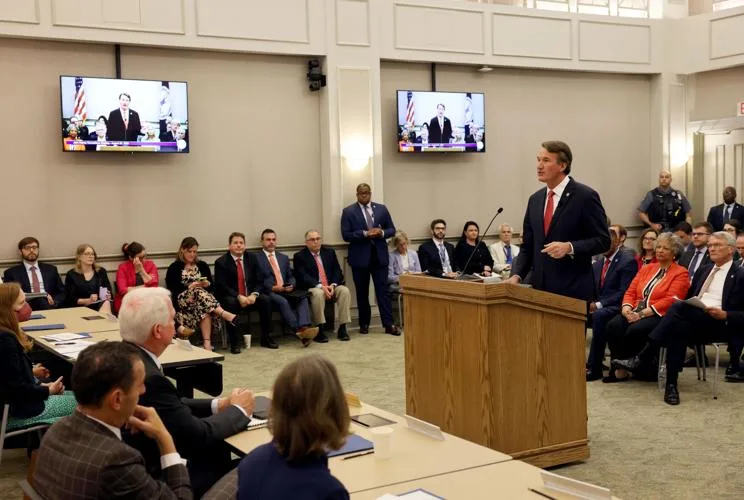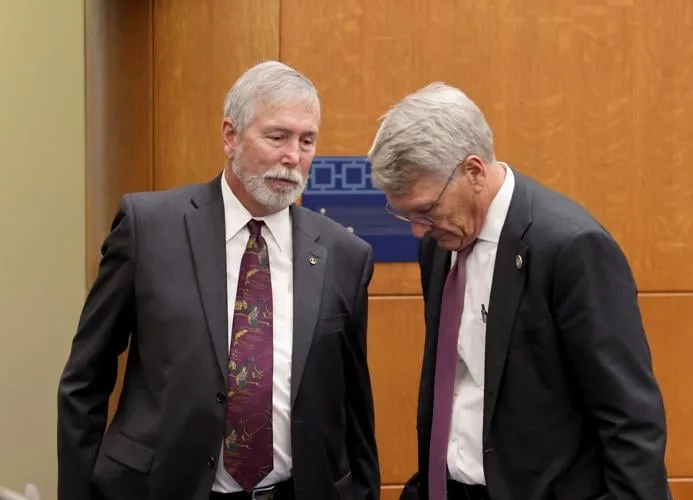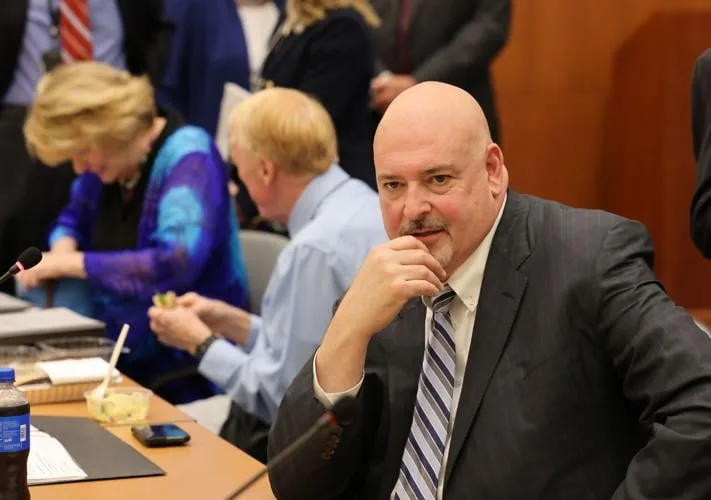The race for the General Assembly is growing commercial.
Even in this off- off- off-year election, with no elections for president, governor or Congress at the top of the ticket, campaigning is a more that $80 million business in Virginia.
That is a third more than farmers get for the state’s iconic tobacco crop, according to a Richmond Times-Dispatch analysis of more than 44,000 spending items on legislative candidates’ campaign finance reports and hundreds more items on political party groups’ reports.
And the businesses making money from elections are changing the way candidates talk about issues and policies.
People are also reading…

The Virginia State Capitol, where the General Assembly is held, will be full of newly elected delegates after Nov. 7.
“Virginia is really the land of no-limits money, and with elections every year, you can really stay on the gravy train,” said Stephen Farnsworth, a political scientist at the University of Mary Washington.
That gravy train is making Virginia politics look a lot more like Washington, said John McGlennon, a government professor at the College of William and Mary.
“We’ve seen that increasing professionalism on Congressional races, and it means campaign messages are much more standardized,” he said.
At least in this cycle, it’s also led to the homogenization of campaigns. Since the vast majority of competitive races are in suburban/exurban areas, the campaigns on both sides tend to look very similar. And while there are local issues that could have a decisive impact (such as data centers in Prince William County) the campaigns are on each side are uniform in issues and tone.
“If there are big bucks involved you’re going to do what they tell you,” Farnsworth said.
For Democrats, for instance, the pros say defending Virginia’s current law allowing abortion during the first two trimesters, is a vote-winner.
For most Republicans, even those with the strongest anti-abortion views, it’s that Gov. Glenn Youngkin’s proposal to bar most abortions after 15 weeks, with exceptions for rape, incest and the life of the mother, is a reasonable compromise.
Farnsworth said there’s so much money available in Virginia politics that candidates aren’t focusing on what are the most effective ways of reaching voters.
“Does it make sense to make an expensive TV buy for a candidate in a district that’s only a sliver of a TV market?” he said.
“What’s the marginal utility of the 30th flyer clogging your mailbox?”
Flyers, consultants
But there’s a lot of money in flyers: candidates have so far spent $10.7 million, with $8.9 million going to political consultancies. Party organizations spent about $7.6 million.
Candidates paid political professionals and consultant companies more than $6.6 million for their advice. Party organizations, caucuses and leadership committees paid more than $7 million more. Those professionals — who generally work with candidates from one party — along with several party groups, donated consulting services to various campaigns that cost them an additional $866,000.
The biggest payments came from Del. Karen Greenhalgh, R-Virginia Beach, who won her first term in the House by a 115-vote margin. She paid consultants more than $517,000.
State Sen. Louise Lucas, D-Portsmouth, paid PocketAces Consulting more than $129,000 for campaign services.
Political professionals do more than give advice.
Richmond-based Creative Direct took in more than $1.1 million handling mailings for Republican candidates; Connecticut-based Mission Control almost as much doing the same for Democrats.
Uplift Campaigns, a California firm, was paid more than $898,000 for digital ads for several Democrats. Gen2 Solutions and FP1 Strategies received more than $401,000 and $379,000 respectively for digital ads for Republicans.
Political professionals also took in more than $225,000 from campaigns for polling and $95,000 for texting services. Party groups and leadership committees paid about $1.5 million.
Robo-calling firms, which deliver voters automated messages, collected more than $800,000 from candidates.
While candidates still seek volunteers, especially to knock on doors, campaigns and outside political groups paid canvassers more than $598,000.
In all, paid staff time exceeded $18.3 million: more than $15 million paid by the campaigns themselves and an additional $3.3 million of costs that political groups assumed and then donated to the campaigns.
While campaign reports show the sums of money going into Virginia elections keep rising, “this campaign season has made yet another revelation — that political professionals and groups and their candidates have got even smarter on how to bend the rule without really breaking it,” said Olusoji Akomolafe, executive director of the Center for African American Public Policy and chair of the political science department at Norfolk State University.
“The revolving door between the services they provide and the money they donate is a prime example,” he said.
Ad spending
TV and radio advertising remains the biggest item on candidates’ shopping lists.
They’ve spent $22 million through Sept. 30 to produce ads and then book air time.
Only three of the top 20 firms they spend money with are in Virginia. The biggest, Sage Media of Washington D.C., received $5.2 million, all from Democrats’ campaigns.
Hampton Roads has borne the brunt of this. Federal Communications Commission and social media data compiled by the Virginia Public Access project say candidates and supporters have dropped more than $10.8 million on TV, radio and social media ads.
The region has a tight state Senate race in District 24 between state Sen. Monty Mason, D-Williamsburg, and former York-Poquoson Sheriff Danny Diggs, and a tight House of Delegates race in District 97 between Del. Karen Greenhalgh, R-Virginia Beach, and Democrat Michael Feggans, an Air Force veteran. Mason and Diggs have spent a combined $4.6 million, Greenhalgh and Feggans an additional $2.6 million.
But candidates in Suffolk-based districts, Del. Emily Brewer, R-Suffolk, against Del. Clinton Jenkins, D-Suffolk for a state Senate seat in District 17, Democrat Nadarius Clark versus Republican Michael Dillender in House District 84 and Democrat Karen Jenkins against Republican Baxter Ennis in House District 89, have spent a total of an additional $3.7 million
Richmond area
Ad spending exceeded $7.6 million in metro Richmond.
Del. Schuyler VanValkenburg, D-Henrico, is challenging state Sen. Siobhan Dunnavant, R-Henrico, in Senate District 16.
The area also has three hotly contested House races — in the Petersburg area between Del. Kim Taylor, R-Dinwiddie, and Democrat Kimberly Pope Adams in District 82 — and in Henrico County, where Democrat Susanna Gibson and Republican David Owen are vying in House District 57 and Del. Rodney Willett, D-Henrico, faces Republican Riley Shaia in House District 58.
“Clearly the funds spent are extraordinary — when you have two races that have already passed the $6 million dollar mark for a job that pays $18 thousand, it’s amazing,” said Bob Holsworth, a longtime Virginia political analyst.
“There are plenty of individuals, specialized campaign firms, and advertising venues that are doing extraordinarily well as a result of politics,” he said.
$1 billion in tax cuts: 4 things to know about the state budget deal
General Assembly budget leaders have reached an agreement that ends a six-month standoff on revisions to Virginia’s two-year budget.
The deal includes more than $900 million in tax cuts, almost all of it through one-time payments of $200 to individual taxpayers and $400 to couples filing jointly.
It does not include cuts in the corporate and individual tax rates that Gov. Glenn Youngkin had proposed, but it would raise the standard deduction for taxpayers who don’t itemize their deductions by half of what the governor had sought and would eliminate the age limit on a new exemption for military retirement income.
Youngkin said this week that he can live with a budget agreement that prioritizes one-time rebates over ongoing tax cuts, but expects to seek additional cuts in the two-year budget that he will propose in December.
Dave Ress (804) 649-6948





